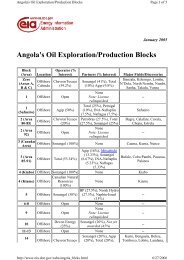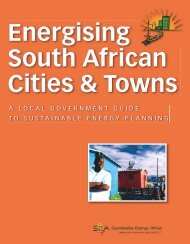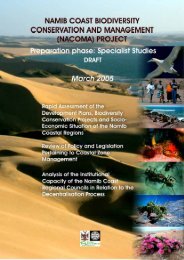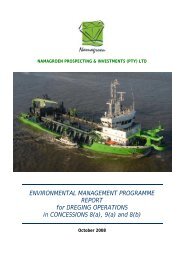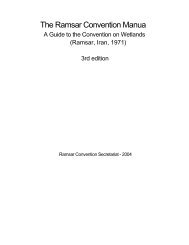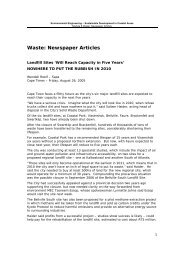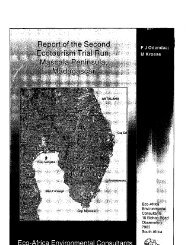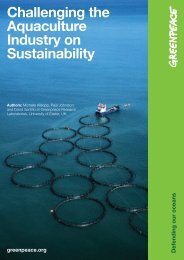Feasibility Study of Proposed Tourism Dev in Shewula, NE ...
Feasibility Study of Proposed Tourism Dev in Shewula, NE ...
Feasibility Study of Proposed Tourism Dev in Shewula, NE ...
Create successful ePaper yourself
Turn your PDF publications into a flip-book with our unique Google optimized e-Paper software.
2.4.4.3. Economic support structures <strong>in</strong> the <strong>Shewula</strong> community.<br />
There is a work<strong>in</strong>g relationship between the Maize Farmers Association <strong>in</strong> <strong>Shewula</strong><br />
and representatives <strong>of</strong> the Ch<strong>in</strong>ese government <strong>in</strong> Swaziland. The Ch<strong>in</strong>ese provide<br />
the necessary <strong>in</strong>puts for maize farm<strong>in</strong>g, on a repayment basis, whereby the farmers<br />
have to "pay" the Ch<strong>in</strong>ese <strong>in</strong> the form <strong>of</strong> a certa<strong>in</strong> number <strong>of</strong> bags <strong>of</strong> maize.<br />
Some technical assistance with agricultural activity is provided to the community by<br />
outreach programmes such as that <strong>of</strong>fered by Mlawula Nature Reserve. The Mlawula<br />
Community Outreach programme provides support and tra<strong>in</strong><strong>in</strong>g for a number <strong>of</strong><br />
projects, <strong>in</strong>clud<strong>in</strong>g the establishment and upkeep <strong>of</strong> permaculture gardens. A<br />
beekeep<strong>in</strong>g programme has been established whereby honey is harvested and then<br />
sold to the M<strong>in</strong>istry <strong>of</strong> Agriculture.<br />
One <strong>of</strong> the community associations which aims to provide support for economic<br />
activities <strong>of</strong> their members is the women's group Asitfutfuke Bomake Association.<br />
Members <strong>of</strong> the group participate <strong>in</strong> an <strong>in</strong>formal sav<strong>in</strong>g scheme, the luholiswano, <strong>in</strong><br />
which people contribute monies to a fund and then each month the accumulated<br />
funds are received by one <strong>of</strong> the contribut<strong>in</strong>g members <strong>of</strong> the group. Money is used<br />
to buy someth<strong>in</strong>g that has been requested by the recipient, such as corrugated iron<br />
for ro<strong>of</strong><strong>in</strong>g, a radio or other items needed or desired by a household. The aim <strong>of</strong><br />
these groups is to help improve the quality <strong>of</strong> life <strong>of</strong> a household, usually by assist<strong>in</strong>g<br />
<strong>in</strong> the improvement <strong>of</strong> homesteads.<br />
In recent months government spend<strong>in</strong>g has contributed to the economic<br />
development <strong>of</strong> local communities. Funds that have recently been made available<br />
for community development total E5.5 million, to be shared between 55 centres 50 .<br />
<strong>Shewula</strong> is one <strong>of</strong> four areas that comb<strong>in</strong>e to form one such centre. The other three<br />
are Mafucula, Lomahasha and Tsambonkulu. Each constituency could therefore<br />
receive up to E100,000, but allocation would depend on the projects that the money<br />
is needed for. E5 million has also apparently been made available for community<br />
game reserves 51<br />
2.4.4.4. Land tenure<br />
In accordance with the traditional land allocation system <strong>in</strong> Swaziland, any<br />
organisation or <strong>in</strong>dividual want<strong>in</strong>g to undertake an operation or use a portion <strong>of</strong> land<br />
<strong>in</strong> <strong>Shewula</strong> must first apply to the traditional leadership and authority structures<br />
(<strong>in</strong>clud<strong>in</strong>g the Chief, his Libandla, and land allocators) for permission to do so. (The<br />
seSwati term for this is Khonto).<br />
The chief <strong>of</strong> a community has the right to allocate land amongst the members <strong>of</strong> a<br />
community under his jurisdiction. In some <strong>in</strong>stances, <strong>in</strong>security <strong>in</strong> land tenure can<br />
arise, such as when groups <strong>of</strong> people change their allegiance from one chief to<br />
another.<br />
2.4.4.5. Local good neighbourl<strong>in</strong>ess <strong>in</strong>itiatives<br />
In the past, disputes over land tenure have sometimes characterised relations<br />
between the <strong>Shewula</strong> community and neighbour<strong>in</strong>g properties, and have resulted <strong>in</strong><br />
some unhappy <strong>in</strong>cidents <strong>of</strong> conflict and violence. One such <strong>in</strong>cident resulted <strong>in</strong> the<br />
death <strong>of</strong> a community member. This created and/or was exacerbated by a number <strong>of</strong><br />
50<br />
These centres are part <strong>of</strong> the Tmkhundla system <strong>of</strong> governance <strong>in</strong> the country. See Section 2.5.2.<br />
51<br />
This was mentioned by Chief Sifundza, who said that the K<strong>in</strong>g stated this <strong>in</strong> his open<strong>in</strong>g speech to parliament <strong>in</strong><br />
March 1999.



